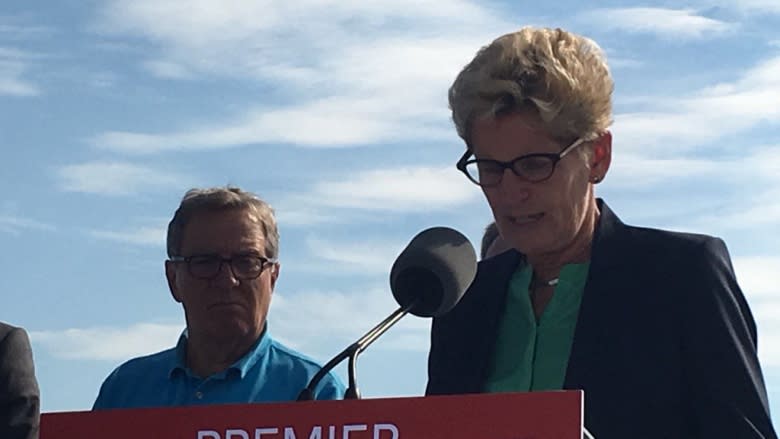Ontario pledges 'support' for year-round road access to 3 remote First Nations
The provincial government says it's working with three remote northwestern Ontario First Nations to develop year-round road access that will link the communities to Ontario's highway system.
The partnership between the province, Webequie, Nibinamik and Marten Falls will also facilitate access to the Ring of Fire — a mineral-rich area in the James Bay lowlands, about 575 kilometres north of Thunder Bay — according to the province.
Ontario Premier Kathleen Wynne made the announcement Monday morning in Thunder Bay, Ont., during her first scheduled stop on a day-long tour of the city. The premier was flanked by three of her ministers — Indigenous Relations Minister David Zimmer, Northern Development and Mines Minister Michael Gravelle and Bill Mauro, Ontario's minister of municipal affairs.
"I'm very pleased to announce today that we have reached an agreement to build a road into the Ring of Fire," Wynne said. "I've looked forward to this particular day coming for some time."
A written release issued in conjunction with the premier's announcement stated that Ontario will "support" ongoing work to plan and construct an east-west road connecting Webequie and Nibinamik to existing highways near Pickle Lake, located about 550 kilometres north of Thunder Bay.
Additionally, the province is pledging support to Marten Falls to plan and build a road to the community that would link to the highway at Nakina and Aroland First Nation, communities about 275 kilometres northeast of Thunder Bay.
Further planning work on a road from Marten Falls north to the Ring of Fire is also being pursued, the province said.
Environmental planning to begin by 2018
Environmental assessments are expected to get underway by January, 2018 with construction — should all approvals be granted — starting in 2019, according to the province.
"Our commitment to this project has never been in doubt, we have always maintained that we were going to make this investment," Wynne said.
The province's release did not mention any new dollars for the work being done, but did say the parties are "actively working" on funding agreements.
"Ontario is working to support these First Nations as they address all regulatory requirements so that this unique environment is protected," the statement said, adding that the agreement "will ensure First Nations and their perspectives, including traditional knowledge, are carefully considered in decision-making."
Announcement 'a big deal' says Webequie's chief
Moving forward on all-season road that would access Webequie is "a big deal," said Cornelius Wabasse, the First Nation's chief.
"Once I hear the word 'commitment,' it's good to hear that word," Wabasse said. "I want that word to become a reality for our community."
Improving access for his community to the rest of Ontario is important, he continued.
"It means that we will be addressing some of the issues that we have in our community," he said, adding that those include the high cost of living, due to Webequie's remoteness, as well as improving the ability for residents to travel to other places.
"There is a lot of work that still needs to be done."
No attempt to 'sideline' other First Nations: Wynne
Ontario's announcement on Monday did not include Neskantaga or Eabametoong, two other First Nations in the region which were both included in a study, announced in 2015, about exploring all-weather road access in the Ring of Fire.
The four First Nations that took part in the study included Webequie, Nibinamik, Eabametoong and Neskantaga.
The province had also been in joint talks with nine First Nations affected by the Ring of Fire, and signed an agreement to work together in 2014.
Since then, the premier has said that First Nations near the Ring of Fire "should not squander" promised funding to develop transportation infrastructure to the James Bay lowlands and that she is willing to work individually with any chief who will work with her.
Neskantaga's relationship with Noront Resources, the largest mining company active in the Ring of Fire, has also notably deteriorated.
On Monday, Wynne denied that communities not included in the newly-announced agreement, like Eabametoong and Neskantaga, are being shut out. "Will we continue to work with all the communities, absolutely," she said.
"If a couple of communities were ready at this point but there will be other communities that are ready a bit farther down the road, then we will work with them," she said.
"I don't think there is any attempt on the part of government or industry to isolate a particular community or to sideline anyone."




